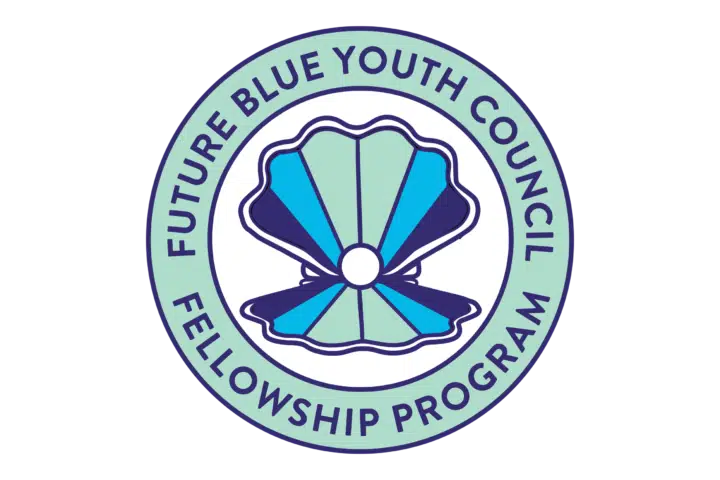
Bow Seat and the Future Blue Youth Council Announce the 2022 Student Fellowship Grantees
December 9, 2021This year, Bow Seat’s inaugural Future Blue Youth Council created the international Fellowship Program, a new by-youth, for-youth grant initiative that provides funding and mentorship to young people who are addressing water-related challenges in their local communities.
The Fellowship application opened in late Spring and invited students ages 13-19 worldwide to propose new or emerging projects that met the program goals of educating the public about a water-related problem, engaging others in activities to address the issue, and advocating for creative and realistic solutions. Throughout the summer, the Future Blue Youth Council offered resources such as webinars, office hours, and toolkits to interested applicants.
We were so impressed by the project ideas we received from students around the world who are committed to and passionate about taking action to protect our blue planet, and we are thrilled to announce the grantees selected for the 2022 Fellowship Program! Each grantee was awarded between $280-$1,000, and will receive ongoing mentorship and support from Bow Seat and the Future Blue Youth Council.
We look forward to working with these inspiring young leaders in the new year to help their projects thrive and make a difference in their communities!
Siddharth Jha (16)
Colombo, Sri Lanka
Save My Sea
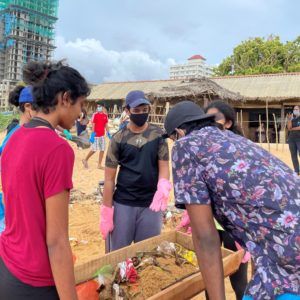 The coastline of Colombo, Sri Lanka, is suffering from one of the worst environmental disasters in the nation’s history, after a fire on the X-Press Pearl cargo ship this summer released tons of tiny plastic pellets (also called nurdles) into the ocean. These nurdles are hyper-absorbent of toxic chemicals and pose a risk to any organism that comes into contact with them. Dead fish, turtles, and other marine animals with pellets in their bellies have already washed up on shore.
The coastline of Colombo, Sri Lanka, is suffering from one of the worst environmental disasters in the nation’s history, after a fire on the X-Press Pearl cargo ship this summer released tons of tiny plastic pellets (also called nurdles) into the ocean. These nurdles are hyper-absorbent of toxic chemicals and pose a risk to any organism that comes into contact with them. Dead fish, turtles, and other marine animals with pellets in their bellies have already washed up on shore.
In response to this disaster, Siddharth created Save My Sea to educate and engage local students who want to help protect their marine environment through public awareness campaigns and beach clean-ups. Save My Sea is already 35 members strong and has forged partnerships with the Marine Environment Protection Authority and renowned Sri Lankan bio-conservationist Dr. Lalith Ekanayake. Siddharth looks forward to growing Save My Sea’s reach and impact in the coming year.
Ishan Kapur (16)
New Delhi, Delhi, India
The Blue Voice
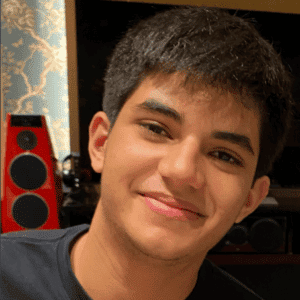 Ishan cannot remember a time when the Yamuna, a river that runs through New Delhi, was not visibly polluted by plastic waste, especially polythene bags. His project aims to reduce plastic pollution in local waterways while simultaneously aiding housing-insecure and other marginalized populations in the city. He will conduct a large-scale plastic bag collection drive through a network of volunteers, then employ disadvantaged women served by the non-governmental organization Hamari Asha to crochet the plastic bags into sleeping mats. The mats each use approximately 700 bags and are lightweight, transportable, waterproof, and do not attract lice or ticks. The mats will then be donated to the unhoused who live on the banks of the river.
Ishan cannot remember a time when the Yamuna, a river that runs through New Delhi, was not visibly polluted by plastic waste, especially polythene bags. His project aims to reduce plastic pollution in local waterways while simultaneously aiding housing-insecure and other marginalized populations in the city. He will conduct a large-scale plastic bag collection drive through a network of volunteers, then employ disadvantaged women served by the non-governmental organization Hamari Asha to crochet the plastic bags into sleeping mats. The mats each use approximately 700 bags and are lightweight, transportable, waterproof, and do not attract lice or ticks. The mats will then be donated to the unhoused who live on the banks of the river.
Anu-Ujin Khurelbaatar (18), Tseenyam Davaasuren (16), Nomin Enkhbayar (16), Namuun Enkhbayar (16)
Ulaanbaatar, Mongolia
Youth Movement for Earth-Friendly Citizens
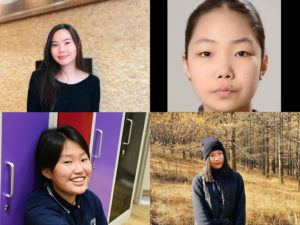 The citizens of Ulaanbaatar’s Ger district are facing two major environmental crises: first, their drinking water is contaminated with bacteria from human feces, primarily because their shared water wells are placed too close to their pit latrines (toilets). Second, incorrect usage of the pit latrines leads to soil contamination, affecting the residents’ only water source, the Tuul River.
The citizens of Ulaanbaatar’s Ger district are facing two major environmental crises: first, their drinking water is contaminated with bacteria from human feces, primarily because their shared water wells are placed too close to their pit latrines (toilets). Second, incorrect usage of the pit latrines leads to soil contamination, affecting the residents’ only water source, the Tuul River.
Through a public awareness campaign, Anu-Ujin, Tseenyam, Nomin, and Namuun aim to educate residents of the Ger district about these contamination issues and how to minimize or prevent them while living sustainably. They also hope to facilitate the swap of a few households’ pit toilets for soil-friendly BioLet composting toilets, and measure the impact on their soil quality.
Elane Kim (16)
Walnut Creek, California, United States
Gaia Literary Magazine
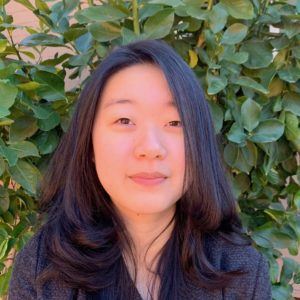 Elane is marrying her passions for creative writing and environmental activism to produce the Gaia Literary Magazine, an online anthology of creative works dedicated to educating a wide audience about the dangers of climate change and to inspiring protection of the planet. She hopes to include contributions from people around the world who represent diverse backgrounds and experiences. Elane’s project will culminate in a virtual open mic, where a community of creatives can share their stories and leave empowered, knowing that their voices can impact the world.
Elane is marrying her passions for creative writing and environmental activism to produce the Gaia Literary Magazine, an online anthology of creative works dedicated to educating a wide audience about the dangers of climate change and to inspiring protection of the planet. She hopes to include contributions from people around the world who represent diverse backgrounds and experiences. Elane’s project will culminate in a virtual open mic, where a community of creatives can share their stories and leave empowered, knowing that their voices can impact the world.
Charmaine Mupara (16) and Thelma Faith Sithole (16)
Mutare, Manicaland, Zimbabwe
Marange Rainwater Harvesting Pits
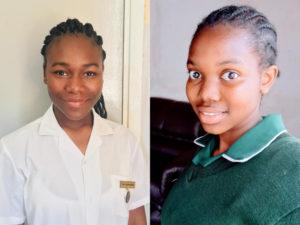 Residents of the rural areas of Marange struggle with climate-induced water scarcity. Through their project, Charmaine and Thelma Faith plan to dig harvesting pits that will collect rainwater and enable it to slowly percolate into the ground, reducing erosion and run-off, and recharging underground water storages. Inside the pits, fruit trees will be planted to ensure food security for local school children. Charmaine and Thelma hope that their project helps to educate these youth about the need to preserve water, and that the students will share what they learned with their families and neighbors.
Residents of the rural areas of Marange struggle with climate-induced water scarcity. Through their project, Charmaine and Thelma Faith plan to dig harvesting pits that will collect rainwater and enable it to slowly percolate into the ground, reducing erosion and run-off, and recharging underground water storages. Inside the pits, fruit trees will be planted to ensure food security for local school children. Charmaine and Thelma hope that their project helps to educate these youth about the need to preserve water, and that the students will share what they learned with their families and neighbors.
Udayan Saha (16)
Dehradun, Uttarakhand, India
Wall Murals to Raise Awareness of the Ancient Water Temples of the Himalayas
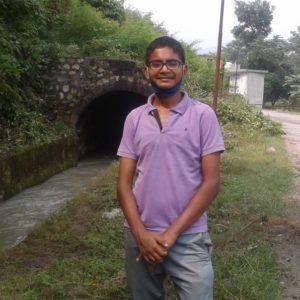 The Himalayas are largely water-scarce, as much of the rainfall flows into the rivers and ends up in the ocean. The region’s ancestors were aware of this issue and therefore created water temples, harvesting structures to tap, conserve, and judicially leverage this precious resource.
The Himalayas are largely water-scarce, as much of the rainfall flows into the rivers and ends up in the ocean. The region’s ancestors were aware of this issue and therefore created water temples, harvesting structures to tap, conserve, and judicially leverage this precious resource.
Udayan’s project focuses on an unused water temple in the mountain village of Matogi in the Dehradun district of Uttarakhand, India—a community that faces water issues regularly. Although the water temple is a good source of perennial water, due to lack of regular maintenance, it is used sparingly. By creating murals on the walls around the water temple, Udayan aims to highlight the water heritage of the Himalayas, the importance of the water cycle, and the interconnectivity among the various elements of nature. The murals will also depict the rich cultural and social activities that once revolved around the water temple before piped water supplies arrived. Udayan’s main objectives are to instill in the community a renewed pride in their water heritage, and to inspire them to take ownership of the water temple’s future upkeep.
Zuzanna Witek (15)
Bydgoszcz, Kujawsko-Pomorskie, Poland
Ocean Literacy Teacher Packages
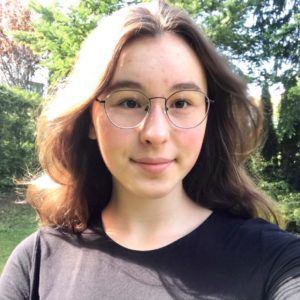 In 2019, Zuzanna created Thriving Corals, a youth-driven program in which high school students create interdisciplinary, engaging lesson plans and activities that combine science, art, and the humanities around ocean literacy principles. Recognizing that there is a lack of educational materials on ocean literacy available to Polish schools, Zuzanna and her team of interns will use Fellowship funding and support to complete Thriving Coral’s nine lesson plans, then translate them from English to Polish and Spanish. In addition, Zuzanna aims to forge formal partnerships with schools and teachers and to bring the lesson plans to many classrooms in the coming year.
In 2019, Zuzanna created Thriving Corals, a youth-driven program in which high school students create interdisciplinary, engaging lesson plans and activities that combine science, art, and the humanities around ocean literacy principles. Recognizing that there is a lack of educational materials on ocean literacy available to Polish schools, Zuzanna and her team of interns will use Fellowship funding and support to complete Thriving Coral’s nine lesson plans, then translate them from English to Polish and Spanish. In addition, Zuzanna aims to forge formal partnerships with schools and teachers and to bring the lesson plans to many classrooms in the coming year.
